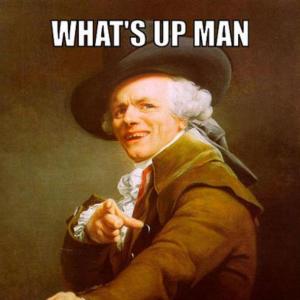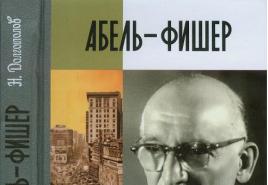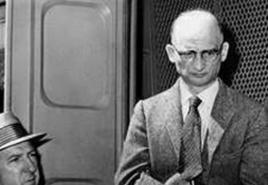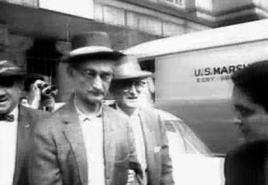How does hav duu duu translate. About the meaning of the phrase How do you do and translation into Russian

Russian-English phrasebook with pronunciation
Traveling to cities and countries where english is spoken, take this with you english phrasebook... By studying it, you will know how to speak English correctly,pay particular attention to the Pronunciation column.
|
English |
Transfer |
Pronunciation |
|
Greeting |
||
| Hi! | Hello! | Hi! |
| Hello! | Hello! | Hello! |
| How do you do? | How are you? | How do you do? |
| Good morning! | Good morning! | Good morning! |
| Good afternoon! | Good day! | Good a: Ftenun! |
| Good evening! | Good evening! | Good and: vning! |
| Good night! | Goodnight! | Good night! |
| How are you? | How are you? | How are you:? |
| And you? | And you? | End yu :? |
| How about you? | And how are you? | Howe ebout yu :? |
| (I am) very well, thank you. | Very good thanks. | (Ai um) veri wel with enk yu :. |
| (I am) fine, thank you. | Great, thanks. | (Ai um) fine with enk yu :. |
| Not bad. | Not bad. | Not bad. |
| So, so. Thank you. | Thank you, so so. | Sow sow with enk yu :. |
| Not so well, thank you. | Thanks, not really. | Not Sow Wel with Enk Yu :. |
| Acquaintance |
||
| What is your name? | What is your name? | Wat from yo: name? |
| My name is ... | My name is… | May name from ... |
| I am Bambooot. | I am Bamboot. | Ay em Bambooot. |
| I am from Russia. | I'm from Russia. | Ay em from Russia. |
| We are from Russia. | We are from Russia. | Ui: a: from rush. |
| Nice to meet you. | Nice to meet you. | Nice to mi: to you :. |
| How old are you? | How old are you? | Howe old a: yu :? |
| I am… years old. | I am ... years old. | Ay uh ... yeh: z oold. |
| What do you do? | What do you do? | Whoa blowing: doo? |
| I am a…. (teacher). | I'am a teacher. | Ai am e chiche. |
| Are you married? | Are you married (married)? | A: u: maryd? |
| I am married. | I am married (married). | Ay uh maryd. |
| I am not married. | I am not married (married). | Ay um not maryd. |
| Do you have any children? | Do you have children? | Doo yu: have you any children? |
| I have one child (two children). | I have one child (two children). | Ay have one child (tu: children). |
| Communication and questions |
||
| Do you speak English? | You speak English? | Do you speak English? |
| Do you speak Russian? | Do you speak Russian? | Du yu: sleep: to rush? |
| What languages \u200b\u200bdo you speak? | What languages \u200b\u200bdo you speak? | Wat langwidges do yu: sleep: k? |
| I speak English but just a little. | I speak English, but not much. | Ay sleep: to and: nglish bat dzha: st e little. |
| Speak slowly, please. | Please speak slowly. | Sleep: to sloley or: z. |
| Sorry, what did you say? | Excuse me, what did you say? | Sori, who did you: sey? |
| Is it correct? | It is right? | From it corect? |
| Do you understand me? | Do you understand me? | Du yu: understand mi :? |
| Can I ask you? | May I ask you (ask)? | Ken ai ask yu :? |
| What can I do for you? | How can I help you? | Wat ken ai du fo: yu :? |
| What do you think? | What do you think? | Wat doo yu: with inc? |
| Who? | Who! | Hu? |
| What? | What? | Wat? |
| What is this? | What it is? | What from sis? |
| Where? | Where? Where to? | Ueah? |
| When? | When? | Wen? |
| How? | How? | How? |
| How do I get to…? | How to get …? | How do ah get tu ...? |
| Where from? | Where from? | Uea from? |
| Where are you from? | Where are you from? | Uea a: u: from? |
| Why? | Why? | Wye? |
| How much is it? | How much is it? | How munch from it? |
| Do you like ...? | You like …? | Doo yu: like ...? |
| Where can I get a taxi? | Where can I get a taxi? | Uea ken ah get e teksi? |
| Statement |
||
| Yes. | Yes. | Yes. |
| Yes, of course. | Yes of course. | Yes of co: s. |
| I agree. | I agree (agree). | Ay egri. |
| With pleasure. | With pleasure. | Wiz plezhe. |
| As you like. | As you wish. | Ez yu: like. |
| All right. OK. Okey. | Well okay). | ABOUT: l wright. Oakay. |
| I see. | Clear. | Ay si :. |
| I am busy. | I'm busy (busy) | Ay uh bizi. |
| Negation |
||
| No. | No. | Know. |
| No, thank you. | No thanks. | Know with enk yu :. |
| No, you may not. | No, I don’t allow. | Know yu: mei note. |
| I do mind. | I object. | Ay doo: mind. |
| I am very sorry, but I can’t. | Sorry, but I can't. | Ai um vari sori bat ai kent. |
| That’s impossible. | It's impossible. | Zthis is imposable. |
| You are wrong. | You are not right. | Yu: a: ron. |
| By no means. | In no case. | Bai know mi: nz. |
| Expression of gratitude |
||
| Thank you!Thanks! | Thank you! | FROMenk yu:! FROMencs! |
| Thank you very (so) much! | Thank you very much! | FROMenk yu: vari (sow) mach! |
| I don’t know how to thank you. | I don’t know how to thank you. | Ai dount know how tu with enk yu :. |
| How kind of you! | How kind of you! | How kaynd ov yu :! |
| You are so kind! | You are so kind! | Yu: a: sow kind! |
| Thank you, it was delicious. | Thank you, it was delicious. | FROMenk yu: it uoz deals. |
| Thank you for your attention. | Thank you for your attention. | Senk yu: pho: yo: ethension. |
| You are welcome! | Please (in response to thanks). | Yu: a: welcam! |
| That’s nothing. | It's my pleasure. | Zetc us ing. |
| Here you are. | Here you go (take it). | He yu: a :. |
| Please | Please, please. | Pliz. |
| Parting |
||
| Gooodbye! | Goodbye! | Good Bye! |
| See you (later)! | See you later! | Si: yu: (leite)! |
| See you soon! | See you soon! | Si: yu: sun! |
| I hope to see you again. | I hope I will see you again. | Ai Hope Too Si: Yu: Aegain. |
| Have a good trip! | Have a good trip! | Hev e good trip! |
| Take care! | Take care of yourself! | Take kee! |
| Good luck! | Good luck! | Good luck! |
|
I wish |
||
| Best wishes! | Good luck! | Best wishes! |
| Congratulations! | Congratulations! | Kengraties! |
| Happy birthday! | Happy Birthday! | Happy byo: with day! |
| Happy New Year! | Happy New Year! | Happy new ye :! |
| Happy anniversary! | Happy wedding! | Nepi eniveseri! |
| I wish you all the best! | I wish you all the best! | Ay weish yu: ol z e best! |
| Have a good time! | Have a nice time! | Hev e good time! |
| Have a good holiday! | Have a good rest! | Have a good holiday! |
English is easy enough to learn tongue... Most sentences can be built simply by taking the desired words from the dictionary.
Next summer we plan to visit London. We are planning to visit London next summer.
Words do not change by gender, which greatly facilitates learning, and the plural is formed very easily, you need to add the letter s to the end of the word being changed (but there are exceptions to the rules). Below is an example of plural formation:
Where can I buy the ticket? Where can I buy a ticket?
Where can I buy tickets? Where can I buy tickets?
Please note that if some words are mispronounced, there may be misunderstandings between the interlocutors. In English, there is a difference in the pronunciation of a long and short vowel. For example, a short full (full) means full, and a long fool (full) means a fool. 🙂 Long vowel in our russian-English phrasebook with pronunciationmarked with a (:) in the pronunciation column. Studying this english, You will learn how to speak English correctlyand also enrich your vocabulary with new words and expressions.
Dear guests of the Bambooot travel club, you have viewed english phrasebook... It is generally accepted that english language is an international spoken language, but other foreign languages \u200b\u200bmay be needed for more comfortable communication abroad. You can get acquainted with them at the following links:
We are waiting for interesting feedback and suggestions from you on how to improve ours.
Friends, hello everyone!
Today I would like to tell you about the meaning of the English phrase "How do you do you?"! Many of you are sure that this is another option to ask "How are you?" in English. In reality, this is not entirely true, and if you tell a native speaker “Hi! How do you do? "hoping to hear back "I'm fine", you may stumble upon a certain amount of misunderstanding on his part.
Translation and use of "How do you do?"
In English, this expression is correct to use when you first meet a person and get to know him. In other words, it's a formal option to politely greet someone you haven't met before or just haven't seen him for a long time.
For example:
Hi, I’m Chack!
(Hi, I'm Chuck!)
How do you do, Chack? I'm John!
(How are you, Chuck? I'm John!)
"How do you do?"does not imply a direct answer and is often used with the exclamation - "How do you do!"Please do not confuse this expression with a question. "How are you?"... They are not the same thing.
how do you do — hello; good day; How are you?;
Goodbye, friends! Until next time!
What else must be remembered is such super-important words for communication and acquaintance as sure [shue] - of course ok please... Its, by the way, you can speak instead of OK on their thank you, thank you that is. Then, variations of the word yes [yes] - yessuch as yeah [ye] and uar [yap]. Then, variations of the word no [know] - no: nope [nope] and nay [nay]; and also the words nice [nice] - nice, beautiful, beautiful, and fine [fine] is about the same as nice.
Here is the arsenal needed to hold out in American society for thirty minutes and not be revealed.
So, stand there and watch. Let's say that someone comes up to you, for example, a girl of some kind, and says:
Hi [hi] what does it mean hello! You, do not be a fool, also say:
Hi [hi], - which also translates as hello!
I am Jane [ay em jane], - I'm Jane / My name is Jane, says the girl.
I am Mike [ah em mike], - I'm Mike, - you say, if that is really your name.
Nice to meet you Mike [nice chu mich yu, mike], - Nice to meet you Mike.
Nice to meet you еoo [nice chu mit yu chu], - And I am pleased too.
Nice party [nice party], - Nice party, - the girl smiles (and all their parties are pleasant, even when they are unpleasant).
Yeah, sure, it's fine [yeh, shue, it's fine]. - Yes, of course, everything is cool, - you say, smiling in response to the girl. Well, then you can offer her something to drink (alcohol brings you closer: the more you drink, the more you understand without an interpreter):
Wanna some drink [uona drink himself]? - Would you like something to drink? - And then, so that she quickly agrees, add: On me [an mi], - I treat... Literally “on me”.
With pleasure [wiz plege], - With pleasureJane replies.
During a conversation, the girl pours out all sorts of words, like, ye, yap, knop, but this does not bother the pass. You already know these words.

When meeting, in particular, a phrase like How do you do may slip between the English, which does not need to be translated as How are you? or How are you? This phrase also means very nice and no more.
Example: You, Ivan Petrovich Ivanov, are brought to a Briton and said:
This is Mr. Anderson [zys is mista Anderson], - This is Mr Anderson.
And this is Mr. Ivanov [end zys issta ivanof], - And this is Mr. Ivanov (Don't expect an English translator to call you by your patronymic. They only hold the first name in high esteem).
How d'you do [how d'you do], - Anderson shakes your hand.
How d'you do, - and you shake his hand.
Well, and to their traditional question How are you? - what was discussed a little higher, answer like Petrushka: Fine, thank you, - and you will always be interpreted correctly.







